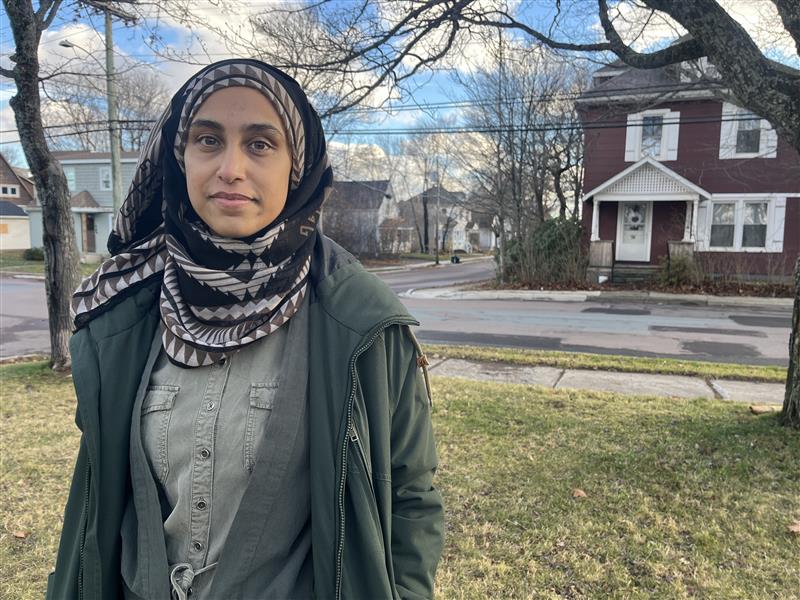A new policy at a New Brunswick school district that requires parents to apply for approval for religious accommodations has one parent concerned it will alienate students.

The approval would be needed for accommodations such as access to a prayer room, fasting or missing school for religious reasons within the Francophone South School District.
“Their process (creates) all of these administrative hoops for people to jump through in order to access very basic rights to prayer — like a quiet room to pray or a quiet corner to pray,” said parent Hafsah Mohammad, whose family is Muslim.
“We’re not asking for anything complex, but they’re making it seem very complex.”
Mohammad, who has a daughter in Grade 3, described the policy as an “affront” that makes the Muslim community feel “othered” and treated as “foreign and threatening.”
Story continues below advertisement“You’re teaching young people that accessing your rights are is arduous, It’s hard work and it’s easier to just relinquish them than to access them.

Get daily National news
Get the day's top news, political, economic, and current affairs headlines, delivered to your inbox once a day. Sign up for daily National newsletter Sign Up By providing your email address, you have read and agree to Global News' Terms and Conditions and Privacy Policy.The district’s superintendent, Monique Boudreau, said the district has been receiving a growing number of requests and wanted to create a standard procedure across all their schools.
She said the policy has been in the works for a year.
More on Canada More videos- Carney, Smith sign pipeline deal, open door to changing B.C. tanker ban
- Ottawa and Alberta have struck a pipeline deal. What does it include?
- Hazardous snow squall warnings blanket southern Ontario
- Guilbeault won’t resign from Cabinet over pipeline deal, government source says
“We were seeing (…) differences in our schools with dealing with these accommodations. Lots of them were verbal and so for us, that’s why we really wanted to have that framework,” she said.
New Brunswick Premier Susan Holt said the provincial government will be keeping a close eye on how the new policy operates.
“I’m glad to see the district is taking that open and leadership role looking at how they can accommodate and support,” she said.
“I can guarantee you the other districts will be watching with interest to see how that can apply and we’re going to be watching with interest as well, as a province.”
Trending Now-
![]() FBI seizes rare multi-million dollar supercar linked to wanted man Ryan Wedding
FBI seizes rare multi-million dollar supercar linked to wanted man Ryan Wedding
-
![]() Carney, Smith sign pipeline deal, open door to changing B.C. tanker ban
Carney, Smith sign pipeline deal, open door to changing B.C. tanker ban
But Mohammad said the policy is especially troubling because it comes just over a month after halal beef was removed from the school cafeterias, leaving Muslim students with only vegetarian options.
Story continues below advertisementHalal food adheres to Islamic dietary laws.
The school district initially served halal beef for all students back in September, saying it allowed them to meet their obligations to honour religious accommodations without having to purchase, store and serve two different kinds of beef.
Having two types of meat would be financially prohibitive, the district said.
After a social media controversy where some parents complained about their children not being able to opt out of eating halal beef, the district announced they would only serve non-halal beef going forward in mid-October.
“The vegetarian options aren’t equally nutritious. So the options that they’ve given as alternatives aren’t necessarily equal,” Mohammad said.
When asked whether the district would put halal beef back on the menu, Boudreau said it’s unclear as of now.
“We’re not saying yes, we’re not saying no. We really have to work with our provider to see if it’s possible,” she said.

 Carney says B.C. and First Nations ‘have to agree’ on Alberta’s pipeline plan
Carney says B.C. and First Nations ‘have to agree’ on Alberta’s pipeline plan
 U.S. brewing school moving to Canada after 150 years
U.S. brewing school moving to Canada after 150 years
 Alberta-Ottawa announce pipeline plan to B.C. coast
Alberta-Ottawa announce pipeline plan to B.C. coast
 Global National: Nov. 26
Global National: Nov. 26
 FBI seizes rare multi-million dollar supercar linked to wanted man Ryan Wedding
FBI seizes rare multi-million dollar supercar linked to wanted man Ryan Wedding
 Carney, Smith sign pipeline deal, open door to changing B.C. tanker ban
Carney, Smith sign pipeline deal, open door to changing B.C. tanker ban


